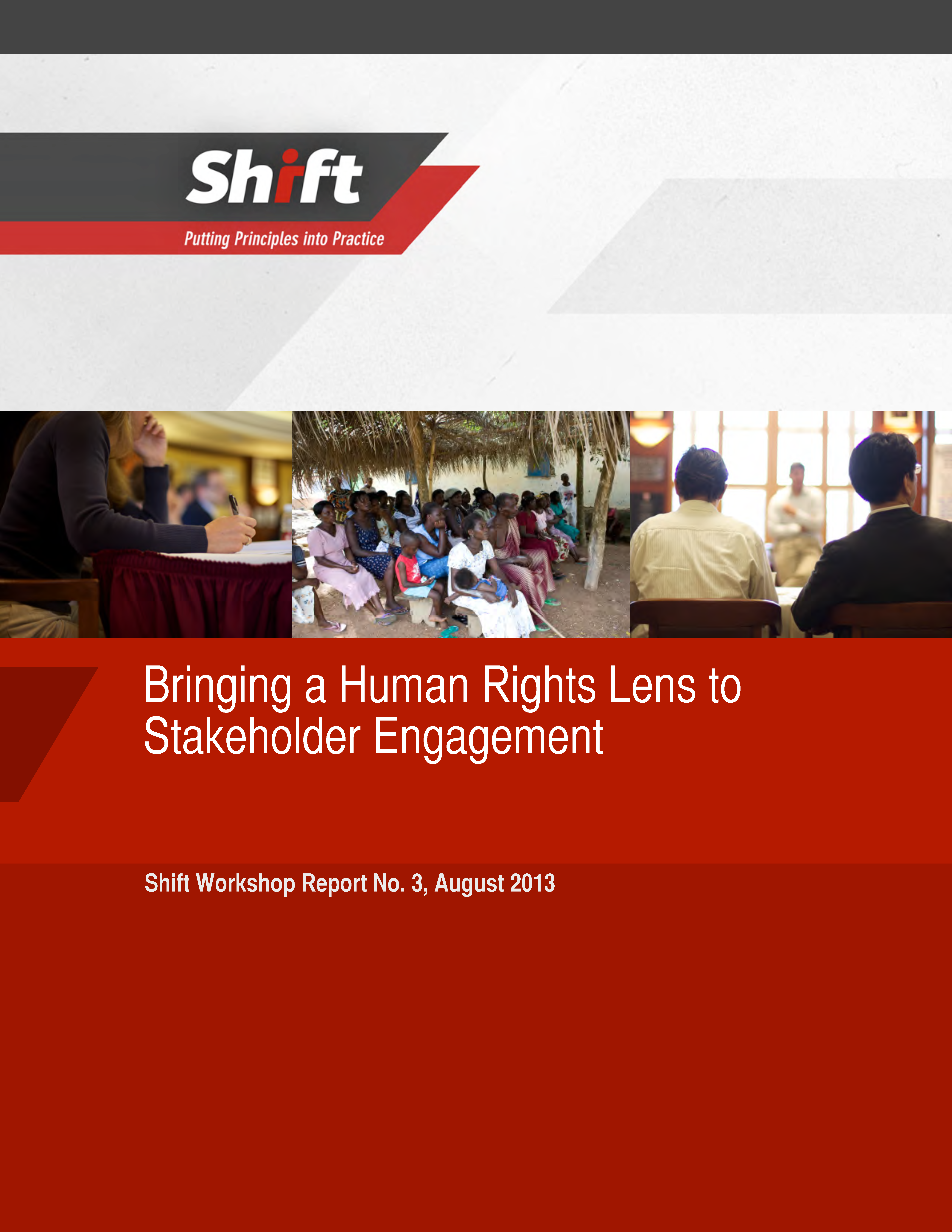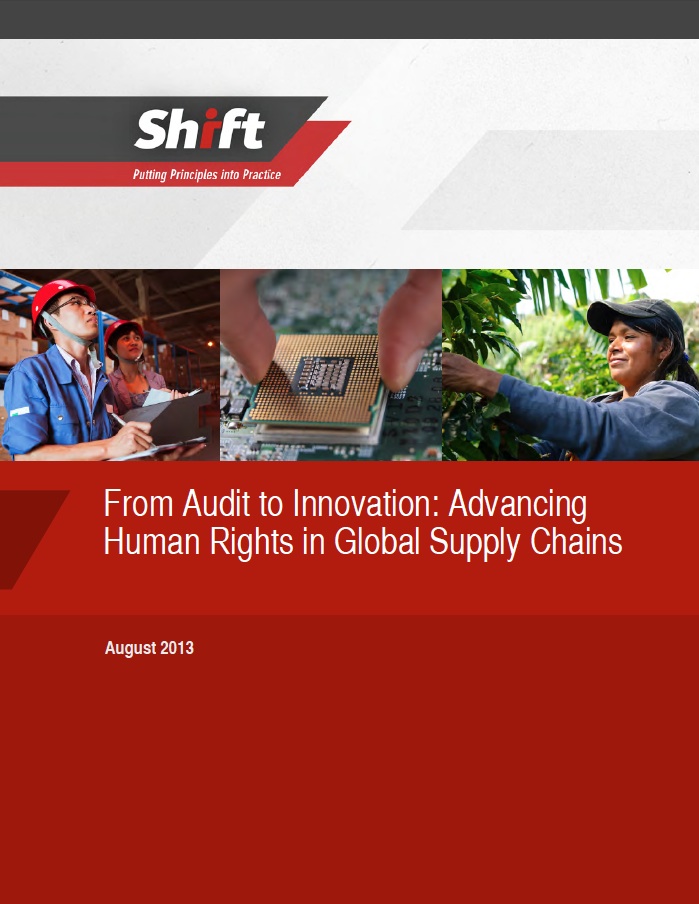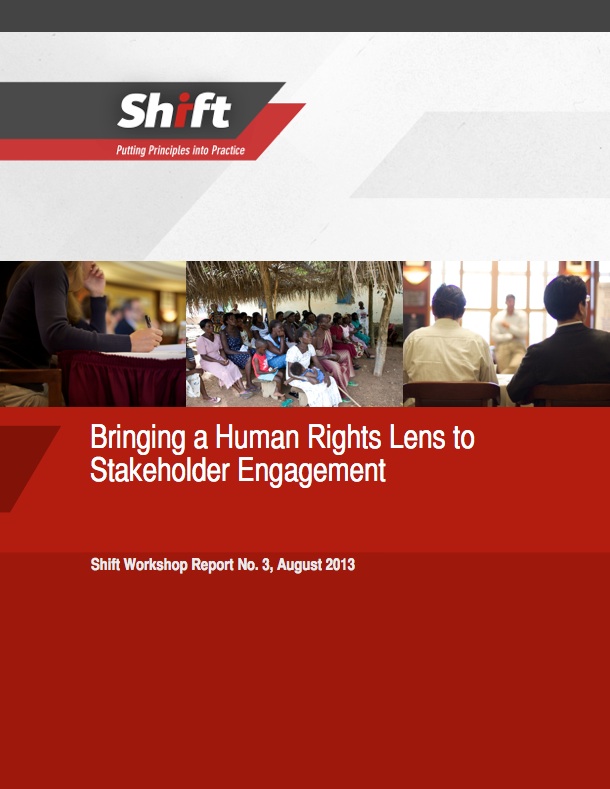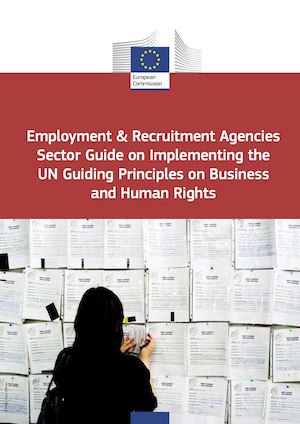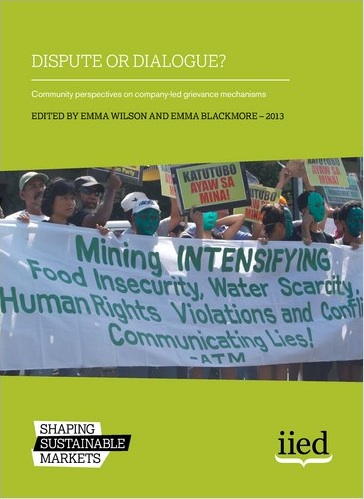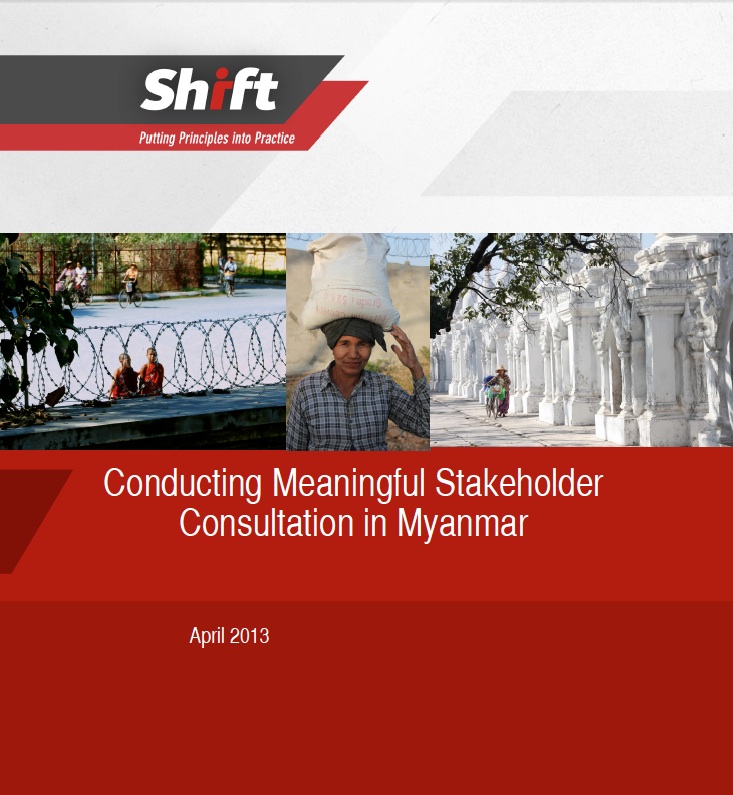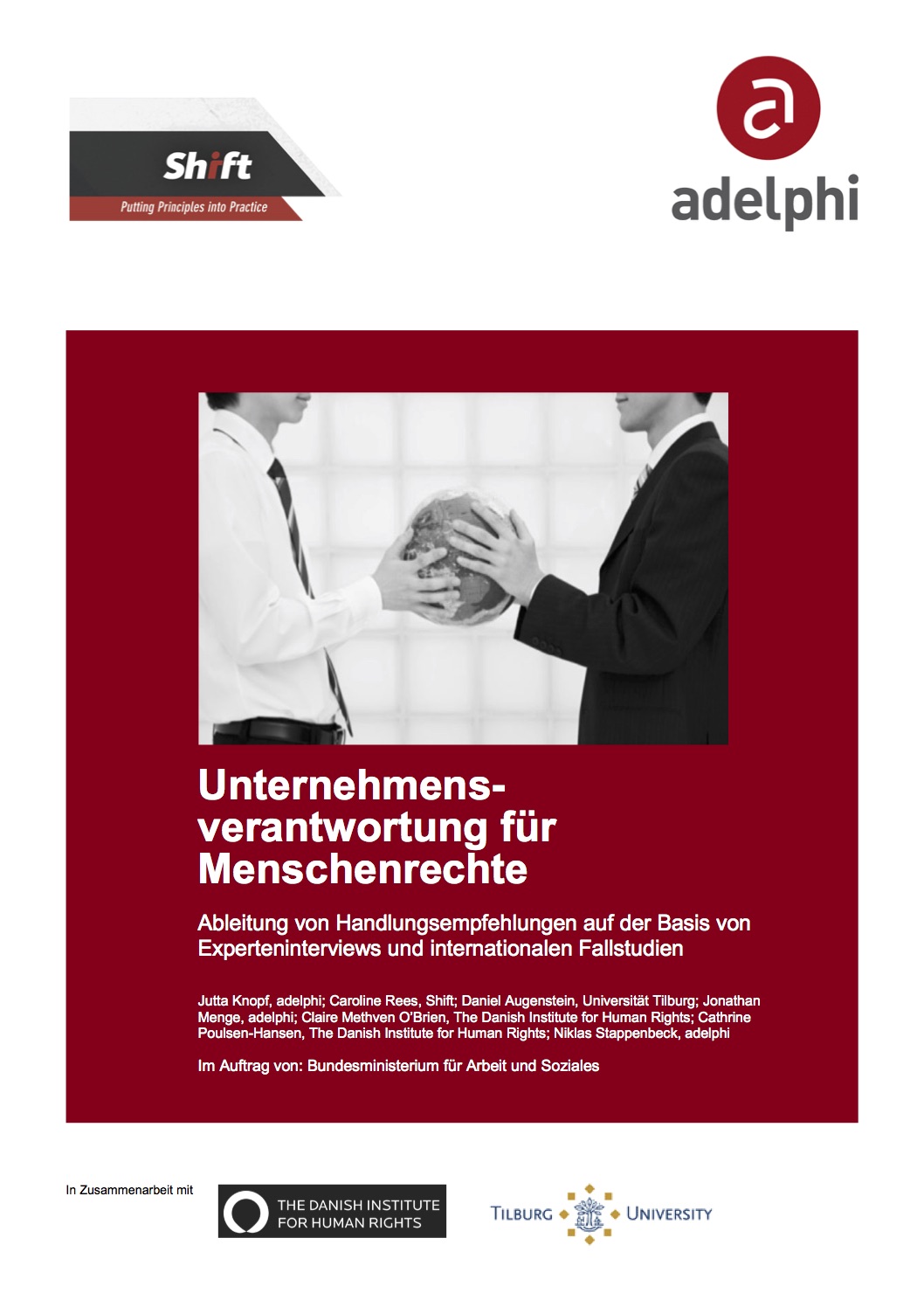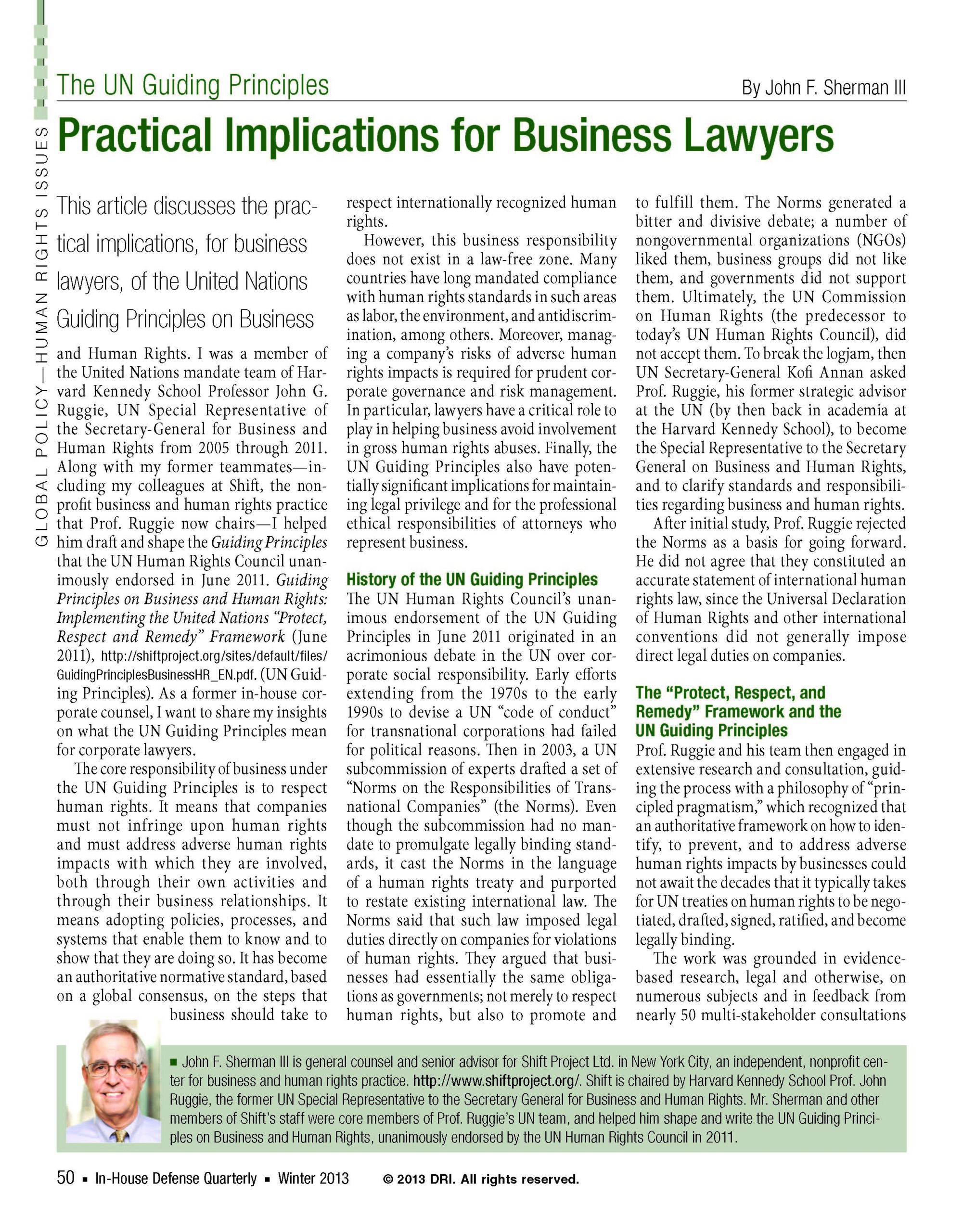Meaningful stakeholder engagement is fundamental to the implementation of the UN Guiding Principles on Business and Human Rights. This resource provides an overview of some of the key approaches companies should have in mind when seeking to ensure that their processes for engaging with affected stakeholders are effective in practice, and help them meet their responsibility to respect human rights.
Archives: Resources
From Audit to Innovation: Advancing Human Rights in Global Supply Chains
Summary
Over the last several decades, global companies have increasingly recognized their roles and responsibilities in addressing social impacts and labor conditions within their supply chains – a responsibility reaffirmed by the Guiding Principles.
As awareness of this responsibility has increased, so too has a recognition of the limitations of the conventional approach to tackling these issues – social compliance auditing. Despite the hundreds of thousands of social compliance audits conducted each year to ensure minimum workplace conditions in companies’ supply chains, there is little evidence that they alone have led to sustained improvements in many social performance issues, such as working hours, overtime, wage levels and freedom of association.
There are many reasons why the traditional audit paradigm has struggled to produce sustainable improvements in these and other key areas of social performance, with each of the following playing their respective roles:
- A lack of disclosure by suppliers of accurate information on their performance during some audit processes, calling into question the value and validity of information gathered;
- A lack of capacity among suppliers to address issues that have been identified for remediation in a sustainable way;
- A lack of perceived incentives among suppliers, both external and internal, to address social performance issues, and a corresponding lack of commitment to invest in sustainable improvements;
- Systemic challenges that are beyond the control of individual suppliers, including social context, regulatory environments, and industry-wide issues;
- The purchasing practices of global brands and retailers, and a need to recognize and improve upon the role they themselves may play in contributing to impacts on workers.
These issues are no secret to global brands and retailers, many of whom have grown increasingly frustrated with the limitations of the traditional audit paradigm. In the absence of clear alternatives, many companies continue to base their due diligence and remediation solely on an audit approach that they privately acknowledge is not producing sustainable results.
However, a number of leading brands and retailers are attempting to change the conversation. They are openly acknowledging what everyone knows – that audits alone have not produced sustainable change.
Instead they are asking – themselves, their industries, their suppliers, and other stakeholders – what to do about it. They have a growing body of individual and collective experience with alternative and supplementary approaches to addressing social performance issues in their supply chains – approaches that seek to recast their relationships with suppliers, from “policemen” to “partners.”
This research, undertaken by Shift in collaboration with the Global Social Compliance Programme (GSCP), is based on conversations with leading companies, industry experts, and – for the four case studies presented – suppliers and other stakeholders. The first part of the report begins by identifying 10 leading trends and elements that form this new generation of social compliance programs for supply chains:
- The shift from pass/fail compliance to comprehensive continuous improvement programs;
- Replacing audits with collaborative assessment and root cause analysis;
- The role of grievance mechanisms in improving social performance;
- The integration of capacity-building approaches for suppliers;
- Different forms of partnerships between global brand companies and civil society organizations;
- Providing commercial incentives to suppliers for improvements in social performance, such as price, volume, duration, and supplier preference;
- Developing metrics to help suppliers identify the business case for better social performance;
- Efforts by brands to use their leverage to address systemic issues;
- Industry-wide collaboration to tackle systemic issues;
- Aligning internal purchasing practices with social commitments made by global brands and retailers.
In the second part of the report, we highlight four company case experiences in more depth, whose approaches combine many of the elements identified above to address complex social performance challenges in supply chains:
- Timberland’s approach to collaborative assessment, which has transformed its relationship with suppliers globally (p. 22);
- Chiquita’s holistic approach to its passion fruit supply chain in Costa Rica, which combines commercial incentives and innovations, capacity-building, civil society partnerships, and adherence to social and environmental standards and practices (p. 34);
- Tesco’s approach to promoting sustainable improvements in addressing issues within its agricultural supply chain in South Africa, premised on the support of local initiatives driven by local actors (p. 42);
- HP’s multilateral approaches to a range of systemic challenges in different parts of its IT supply chain, through which it collaborates with industry, civil society, and government actors to address industry-wide issues (p. 49).
This report does not attempt to imply that any company has the best model for, nor a perfect record in, addressing supply chain human rights challenges. Nor did the research seek to rigorously test the models discussed. Rather, it explores innovative models used by leading companies, who themselves report their effectiveness, as a basis for further analysis and evaluation.
Bringing a Human Rights Lens to Stakeholder Engagement
Summary
Stakeholder engagement is foundational to effective implementation of the UN Guiding Principles. Meaningful stakeholder engagement is particularly essential in a business’ efforts to meet its corporate responsibility to respect human rights. An increasing number of companies have sophisticated systems and processes for conducting a wide range of stakeholder engagement activities, and there is a substantial body of guidance around effective stakeholder engagement.
However, in practice, many human rights impacts can be linked back to challenges related to stakeholder engagement. It appears that more effective stakeholder engagement often could have prevented or mitigated them.
The Guiding Principles reference the importance of consulting with affected stakeholders at several key moments:
- in identifying and assessing actual and potential human rights impacts;
- in tracking and reporting on company efforts to prevent and manage those impacts;
- in designing effective grievance mechanisms and remediation processes.
Affected stakeholders may include:
- staff (employees and contract workers) and communities directly affected by a company’s operations;
- more physically remote stakeholders affected through business operations in a company’s supply chain;
- customers or end-users of a particular product or service who may be even more dispersed, such as in the ICT or financial services sectors.
Companies may also choose to engage at the broader policy level with issue expert stakeholders: individuals whose human rights are not themselves affected by a company’s activities, but who can provide insights into identifying and addressing human rights challenges, and with whom it may be important for companies to communicate about their overall performance on human rights issues. Engaging with issue experts may be helpful to companies, but it is not a replacement for engaging with affected stakeholders.
Key elements for companies to consider when engaging with stakeholders on human rights issues include:
- Engaging the right stakeholders;
- Engaging about the right issues;
- Engaging the right way;
- Engaging at the right time;
- Engaging at the policy level;
- Engaging internally;
- Engaging neutral parties.
Supporting the OECD on Stakeholder Engagement in the Extractive Sector
Update: In 2016, the OECD published the OECD Due Diligence Guidance for Meaningful Stakeholder Engagement in the Extractive Sector.
The OECD Guidelines for Multinational Enterprises set out a range of recommendations with regard to responsible business conduct. Following their revision in 2011, they now include a new chapter on human rights, which mirrors the language of the Guiding Principles. They also include a new provision regarding stakeholder engagement, which states:
“Enterprises should engage with relevant stakeholders in order to provide meaningful opportunities for their views to be taken into account in relation to planning and decision-making for projects and/or other activities that may significantly impact local communities.” (Chapter II.14)
Shift is pleased to have collaborated with the OECD to explore the potential for new guidance on the implementation of this provision of the Guidelines. This collaboration was part of the OECD’s “proactive agenda,” led by the governments of Canada and Norway.
Shift submitted a discussion paper in June 2013 on stakeholder engagement in the extractive industry, setting out options and recommendations for a proposed “user guide” to address this issue. The paper considers how best to build on existing guidance and address relevant gaps. It was discussed at the inaugural meeting of the OECD Global Forum on Responsible Business Conduct in June 2013.
Related to the OECD Guidelines, also see:
European Commission Sector Guides on Implementing the Guiding Principles
The link above leads to all three guidance documents in English. There are also a few unofficial translations of these guides: Japanese: ICT sector | French: oil and gas sector
While implementing the Guiding Principles is very specific to each company, there are common challenges and strategies by industry or sector. These guidance documents feature “a to z” guidance for companies in three sectors: information and communication technology (ICT), oil and gas, and employment and recruitment. The guides were developed through an extensive process of multistakeholder consultation.
Learn more about the collaboration that supported the development of these resources.
Dispute or Dialogue? Community Perspectives on Company-Led Grievance Mechanisms
This book includes a foreword and overview chapter authored by members of the Shift team. The summary below is excerpted from the resource.
Summary
What is a company– community grievance mechanism?
We define a company–community grievance mechanism as a process or set of processes for receiving, evaluating and addressing grievances from affected communities, in a timely and consistent manner at the site or operational level. The mechanism may be wholly or partially run by the company. Grievances might be real or perceived: the latter may be a source of acute anxiety for communities and can be addressed through dialogue and provision of timely and accurate information.
Extractive industry companies and their investors increasingly see a strong business case for building good relations with local communities, and addressing conflict and potential conflict in a timely and effective manner. This involves engaging meaningfully with communities affected by project operations, so as to build trust and to respond appropriately to any local concerns, major or minor. If left unaddressed even minor complaints may escalate into disputes or even violent conflict. This is potentially devastating for local communities. From the company perspective, it can also result in damage to its reputation, a loss of operational time and money, and it can put future investment opportunities at risk.
Effective channels by which local communities can voice their concerns about a project — and get these concerns addressed — are particularly important. In general the only formal mechanisms by which citizens can challenge the activities of extractive companies tend to be those available under host country legislation. However, courts and tribunals in host countries, particularly in developing countries and emerging economies, can be inefficient, corrupt or reluctant to interfere with extractive industry activities (Schwarte and Wilson, 2009). This can result in increased conflict and resentment among host communities, which may be a key legacy challenge when one company acquires a project from another.
Leading oil and gas, mining and forestry companies are starting to establish their own formal mechanisms to address and resolve local citizens’ grievances. Grievance mechanisms provide a channel for concerns to be identified and addressed before they escalate. As part of an effective overall community engagement strategy, they can help to build trust with stakeholders, reduce operational risks and enhance management of project impacts and community relations.
Frequently companies establish grievance mechanisms in order to comply with the formal requirements of project finance and international certification initiatives, which address conflict resolution and human rights protection. Since 2006, for example, the International Finance Corporation (IFC) requires its clients — companies that receive project finance — to set up and administer procedures to address project-related grievances from affected communities. Other international financial institutions have similar requirements. The environmental management systems standard ISO 14001 of the International Organization for Standardization (ISO), and the Forest Stewardship Council (FSC) certification standard both require certified companies to establish company–community grievance mechanisms.
More recently, a major influence on the adoption and development of grievance mechanisms, and on public awareness, has been the work of Professor John Ruggie in his role as UN Special Representative on Business and Human Rights, and the UN Human Rights Council’s endorsement of the UN Guiding Principles on Business and Human Rights (UN/OHCHR, 2011) (see Chapter 2).
There is a growing body of literature on company– community grievance mechanisms, supported by online resources such as BASESwiki (transferred to the ACCESS platform in 2013).
In general, there is a need for more long-term analysis of the implementation, impact and effectiveness of grievance mechanisms, including analysis of the broader societal impacts beyond day-to-day resolution of grievances. Having identified in particular a lack of material on the community perspectives on company-led grievance mechanisms — their effectiveness and impact on sustainable development and livelihoods locally — IIED sought to address this by undertaking and commissioning the research in this book, with case studies based on a mix of desk-research, interviews and fieldwork.
Chapter 2 is a review of the current literature and experience of grievance mechanisms. Based on desk-research and interviews with company and industry experts, it explores definitions of the term ‘grievance mechanism’; some history behind the evolution of grievance mechanisms including alternative dispute resolution; key drivers, standards and guidance for their design and use; and consideration of future trends in grievance mechanism development. This is followed by a series of four chapters focusing on case studies in the oil and gas, mining, and forestry sectors.
Chapter 3 covers the grievance mechanism run by BP in Azerbaijan for the 1,768km Baku–Tbilisi– Ceyhan (BTC) pipeline, which passes through Azerbaijan, Georgia and Turkey. The BTC pipeline project has been the focus of considerable international scrutiny by civil society organisations and project lenders, due to its size and impact and international profile. The project has benefited from investing in civil society capacity building during the construction phase, which has enabled informed dialogue between the company and civil society over the years. The case study highlights the need to balance government and company responsibilities in resolving grievances. It also demonstrates how a major international project such as this can positively influence government practice.
Chapter 4 is a case study of the company Congolaise Industrielle des Bois (CIB), which manages around 1.4 million hectares of tropical forest concessions in the northern Republic of Congo. The company achieved its first FSC certificate in 2006 and full certification in 2010. FSC has been a key driver for CIB to establish a grievance mechanism for resolving land-related disputes and for providing fair compensation for loss or damage to property, livelihoods and resources. This case study demonstrates how grievance mechanisms can be based on existing community structures and underscores the need to respect traditional conflict resolution approaches.
Chapter 5 relates to the Sakhalin-2 oil and gas project in the Russian Far East. Like the BTC project, Sakhalin-2 has used project finance, and has come under considerable international scrutiny and criticism, but is also seen as a pioneer of community engagement in Russia. This case study analyses the experience of the operating company, Sakhalin Energy, in addressing grievances and building a dialogue with the indigenous peoples in the north of the island. This is then compared to a conflict that has developed with a (non-indigenous) dacha community located close to a liquefied natural gas plant in the south of the island. The case study provides an example of a well-functioning grievance mechanism, but highlights the need to understand the full range of complexities associated with building dialogue with communities, including outside the grievance resolution process.
Chapter 6 considers the effectiveness of three different grievance mechanisms and stakeholder engagement processes implemented by mining companies. The first is Anglo American’s approach to stakeholder engagement, its grievance mechanism and the computerised system employed to manage grievances. The second is TVIRD in the Philippines, which demonstrates the value of building on local and traditional modes of communication and dispute management to create culturally appropriate grievance mechanisms. The third case, Kaltim Prima Coal in Indonesia, illustrates the ‘governance gaps’ that exist in a number of developing countries that a company–community grievance mechanism can help to fill.
The book’s findings demonstrate the importance of having an open and responsive overall approach to stakeholder engagement within which a grievance mechanism can be employed effectively. The book offers examples of successful approaches for enhancing dialogue — from civil society capacity building to designing engagement around traditional decision-making processes, as well as system innovations such as electronic logging, which facilitate the monitoring and management of grievance resolution within the company. The book considers community conflict with an eye to understanding the mechanics and the challenges of how company– community engagement takes place in practice. It also offers local perspectives on the implementation of standards and processes that are frequently analysed primarily at the level of system or process. As such the book offers a fresh take on a growing body of literature on company–community grievance mechanisms.
Conducting Meaningful Stakeholder Consultation in Myanmar
The research for this report was funded by the Government of Sweden. | Also see our Viewpoint on this topic
Summary
A large number of western companies from a wide range of sectors are now seeking to operate in Myanmar and can bring a number of substantial benefits to Burmese citizens. At the same time, Myanmar is only recently emerging from years of military rule that were characterized by extensive human rights violations, weak rule of law, corruption, and decades of civil war in Myanmar’s ethnic states. In this context, companies face significant risks of causing, contributing to, or being linked to negative human rights impacts in Myanmar. The UN Guiding Principles on Business and Human Rights, endorsed by the UN Human Rights Council in June 2011, provide guidance on how meaningful consultation with potentially affected groups and other relevant stakeholders can assist companies, both to gauge and mitigate their risk of involvement with human rights impacts.
Shift compiled this report to assist companies that are considering operating, or are already operating, in Myanmar as they structure their stakeholder engagement process. Shift conducted community consultations and interviews with representatives of non-governmental organizations, networks of organizations, think tanks, and other civil society organizations, as well as entrepreneurs, Embassies and development agencies in Myanmar and on the Myanmar/Thai border. The questions asked were designed to (1) enable a survey of stakeholder viewpoints relating to the entry of companies into Myanmar, and (2) elaborate on the elements for companies to consider when structuring a stakeholder engagement strategy. A number of recurring themes emerged from the answers provided.
High Expectations: Interviewees have high expectations of the benefits that companies can bring to Myanmar. Not only do they look to companies to create jobs and decrease the level of poverty, they also hope that companies can assist in ensuring that Myanmar’s recent economic and political reforms pave the way for a peaceful future, founded on respect for human rights and fundamental freedoms, by all and for all. Interviewees further observed that the entry of new companies can be an opportunity to set higher standards for corporate conduct than those imposed under current laws, which were deemed to be inadequate, weak and poorly-enforced.
Significant Fear: Interviewees expressed significant fear of being taken advantage of as the country opens up to the outside world. Interviewees remarked that they have yet to see benefits resulting from the presence of companies. Moving forward, they would like to see companies establish a ‘win-win’ situation, where corporate operations benefit both the companies and the people of Myanmar generally, rather than a select few within the country. Interviewees further feared that companies would structure their operations in Myanmar without an accurate understanding of the situation on the ground. They emphasized how fragile and complex the recent economic and political reforms are.
Interviewees noted with concern the increase in land grabbing. In particular, the mere anticipation of business is leading unscrupulous powerful individuals as well as crony-led companies to grab land, which they plan in turn to sell to companies at a profit in the future. They feared that companies would perpetuate low labor standards and contribute to environmental degradation. Interviewees also requested that companies make an extra effort to prevent violent crackdowns against protestors, and urged companies to recall that freedom of expression and peaceful assembly is very new in Myanmar and that its limits are currently being tested by local communities. Interviewees expressed concern that new companies may wipe out their small farming businesses or favor one group of Burmese over others. A large number of interviewees remarked that companies will have to hold themselves to a higher standard than the current laws and regulations.
Regional Differences: Interviewees from ethnic states remarked that companies are not welcome in the ethnic states until the ceasefire agreements are stable, peace agreements have been concluded and political dialogue has been achieved. The interviewees noted that the stakes are high in the current context. They fear that companies will upset the ongoing democratic reform process that is still seen as extremely fragile. Interviewees further noted that change has yet to trickle through outside of the larger cities of Yangon, Naypyidaw and Mandalay.
Shifting Civil Society Scene: Interviewees emphasized that stakeholder consultation in a country emerging from decades of military rule is necessarily complex. They underlined that the long history of opposition to the military regime makes the situation especially polarizing and that the role of civil society, including community-based organizations and non-governmental organizations, was shifting considerably.
Determining Stakeholders to Engage With: Interviewees highlighted a large number of organizations that could assist companies in understanding the specific context in their area of operation, identifying who to speak with, and providing guidance on how to tailor stakeholder engagement so that it is meaningful in that area. The stakeholders identified included the government and the political opposition, international actors, local networks and sector-specific organizations working, for instance, on land, labor, the environment, gender, and special economic zones. Interviewees highlighted the added complexity of meaningful consultation in ethnic states characterized by years of armed conflict, poor living conditions, and negative experience with corporate engagement. They identified a number of community-based organizations, issues-specific civil society organizations, and youth and student organizations that can assist companies in structuring their stakeholder engagement in these ethnic states, once political dialogue has been achieved.
Expectations of Meaningful Consultation: Interviewees expected companies to proceed with genuine, meaningful consultation and provided suggestions for how companies can conduct grassroots stakeholder consultation which involves: (1) transparency and understanding in a public education phase, (2) inclusion in a public dialogue phase, and (3) integration of community concerns in a feedback phase. They saw these phases as key for companies to provide a “win-win” situation that benefits both the companies and the Burmese people at large.
Collaborating With the IFC on Guidance for High Risk Contexts
Jump to: Overview of our work with financial institutions on the Guiding Principles | Our report on human rights due diligence in high risk circumstances
In alignment with the International Finance Corporation’s (IFC) revised Performance Standards on Environmental and Social Sustainability, the IFC has been exploring the development good practice guidance for its private sector clients on the issue of human rights due diligence in high risk circumstances. Shift provided expert input to the IFC in 2013 on the content of potential guidance.
The Performance Standards’ requirements regarding the environmental and social due diligence processes that all IFC-financed projects must have in place are robust; however, the Performance Standards themselves recognize that, in certain high risk circumstances, it may be appropriate for companies to complement these processes with specific human rights due diligence (see Performance Standard 1, footnote 12). This raises two key framing questions that any guidance on this issue should address:
- Under what circumstances might specific human rights due diligence be appropriate;
- What should human rights due diligence entail in such high risk circumstances?
Any IFC guidance on these questions would need to be practical, relevant and grounded in the challenging realities facing companies that operate in complex, high-risk contexts. It should also build upon existing resources for companies on these issues, and seek to ensure a convergence of guidance wherever appropriate.
While the immediate audience for good practice guidance issued by the IFC is IFC client companies, the impact of the Performance Standards extends well beyond IFC-financed projects – providing a global benchmark referenced by numerous public and private financial institutions, as well as informing the policies and practices of many companies operating in emerging markets.
This collaboration informed a report that we published in 2015 on human rights due diligence in high risk circumstances.
Unternehmensverantwortung für Menschenrechte: Ableitung von Handlungsempfehlungen auf der Basis von Experteninterviews und internationalen Fallstudien
Also see: our news update on support to the German government on its National Action Plan on implementing the Guiding Principles.
This study was a precursor to the consultation process on a German National Action Plan on Business and Human Rights and is available in German only. The summary is excerpted from the resource.
Summary
Das Bundesministerium für Arbeit und Soziales (BMAS) hat die vorliegende Studie zur Umsetzung der VN-Leitprinzipien im Rahmen der „Nationalen Nachhaltigkeitsstrategie zur gesellschaftlichen Verantwortung von Unternehmen (Corporate Social Responsibility – CSR) – Aktionsplan CSR – der Bundesregierung“ vergeben (im Folgenden kurz: CSRAktionsplan).
Der CSR-Aktionsplan sieht u. a. ausdrücklich die „Stärkung von CSR in internationalen und entwicklungspolitischen Zusammenhängen“ (Bundesregierung 2010: 23) vor. Vorliegende Studie ist im Kontext dieser Bemühungen zu verorten und soll laut Ausschreibungstext dazu beitragen, „Voraussetzungen und mögliche Wege für die Umsetzung der von Prof. Ruggie beschriebenen ‚Guiding Principles‘, insbesondere zum Kapitel ‚The corporate responsibility to respect human rights‘ […, zu] erörtern. Dabei soll es im Kern um die Frage gehen, ob und inwieweit staatliche Institutionen Unternehmen hierbei unterstützen können.“
Vor diesem Hintergrund stellt die Studie als Basis für die weitere Untersuchung und Analyse zum einen die Anforderungen der Leitprinzipien der Vereinten Nationen (VN) an Unternehmen in Bezug auf deren Verantwortung, die Menschenrechte zu respektieren, dar. Zum anderen berücksichtigt sie die korrelierenden Anforderungen an Staaten, die sich aus der Verpflichtung ergeben, die Menschenrechte zu schützen. Entsprechend der Konzeption des Gesamtprojektes basiert die Studie des Weiteren auf 22 leitfadengestützten, vertraulichen Experteninterviews mit Vertretern/-innen von Unternehmen (kleiner und mittelständischer sowie großer Unternehmen), Unternehmensverbänden und -netzwerken, der Zivilgesellschaft, von Ministerien, der Wissenschaft und aus dem gewerkschaftlichen Bereich sowie auf fünf Fallstudien zu Beispielen guter Praxis aus Dänemark, Norwegen, Großbritannien, den Niederlanden und den Vereinigten Staaten von Amerika (USA).
The UN Guiding Principles: Practical Implications for Business Lawyers
This article, available here courtesty of its original publisher In-House Defense Quarterly, focuses on the significance and implications of the Guiding Principles for corporate lawyers and the role of lawyers in meeting client business goals while respecting human rights.
